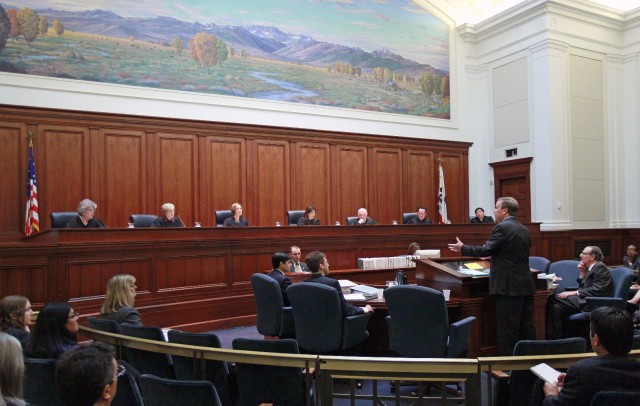Below is an edited transcript.
JOSHUA JOHNSON: What was your reaction to the decision?
SERGIO GARCIA: I just broke down and started crying. This is a long journey. I decided to be an attorney when I was 10 years old; it’s taken me 26 years to finally see my dream realized.
JOHNSON: Why law?
GARCIA: I always wanted to do law, Even though I come from an extremely poor family. I always thought that poor people should have a fair shake at justice too and people should get the justice they deserve not the justice they can afford.
JOHNSON: Is there something that happened in your life to bring you to that realization?
GARCIA: Yeah, I was in Mexico at the age of 10 and I saw poor people being locked up for unjust reasons and not let go unless they could bribe their way out of jail. I saw how much the families suffered trying to raise money to bribe their way out of there, and I have very low tolerance for injustice. Right then and there I made my decision that one day I would be a lawyer. Of course it was kind of a silly decision because I was a 10-year-old poor, stricken boy who went to school many times hungry with my shoes all torn.
JOHNSON: your critics have questioned how you’re supposed to be able to protect people and bring forth justice and uphold the laws when your presence in this country is a violation of federal law. How do you respond to that?
GARCIA: I think when you’re successful you’re always going to have critics. It’s easy to simply say how can you uphold the law when you’re not lawful yourself. If you analyze my case, this is a civil infraction, being here waiting for my green card that’s been approved for 19 years from my dad’s application, who is a U.S. citizen. It’s a civil violation, subject to a $50 fine. That shows you how little the federal government really thinks of it as a violation.
I was brought here as a minor. After that I applied for and was approved for a green card, so the only thing I’m doing is waiting until that green card becomes available. If anyone is going to be upset, they should be talking to the federal government and wondering why it takes 19 years to get a green card.
JOHNSON: What are you going to do from here?
GARCIA: I have to plan out my swearing-in ceremony and also I have a foundation. We will attempt to raise $100,000 from now until the day I get sworn in to give away in scholarships for students. I feel government has abandoned education, and we need to step in for people who can’t afford it. Tuition prices are ridiculous these days.
JOHNSON: In last few years a number of immigrants have come out and been more open about being undocumented and still being contributing parts about society.
GARCIA: For me it was never about coming out. I’m aware of the people you’re talking about, and I don’t necessarily compare myself to them. I’m a professional trying to become an attorney and in the process bring about social justice. I don’t consider myself an activist. I’m simply a professional trying to do what I consider to be the right thing, to set a precedent so nobody has to suffer for years of waiting.
